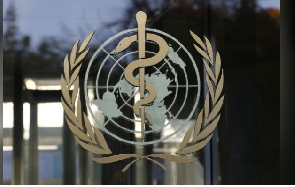- Home - News
- TWI News | TV
- Polls
- Year In Review
- News Archive
- Crime & Punishment
- Politics
- Regional
- Editorial
- Health
- Ghanaians Abroad
- Tabloid
- Africa
- Religion
- Election 2020
- Coronavirus
- News Videos | TV
- Photo Archives
- News Headlines
- Press Release
Health News of Monday, 7 November 2022
Source: GNA
Maldistribution of doctors, health professionals need urgent action — WHO
The World Health Organisation (WHO) has described the maldistribution of medical doctors and other critical health professionals as a crisis that needs urgent and strategic corrective action to address. It, therefore, called on the government and other relevant stakeholders to fulfill their global commitments towards achieving the Sustainable Development Goals on health, poverty, economic growth, empowerment of women and youth through strategic investments in rural health workforce and protection of rural workers. Dr. Francis Chisaka Kasolo, the Country Representative of WHO to Ghana, made the remarks as a guest speaker at the opening ceremony of the 64th Annual General Conference of the Ghana Medical Association (GMA). The conference was held in Bolgatanga, the Upper East Region on the theme: “Addressing the doctor distribution dilemma: the case of Ghana and its underserved areas”. The Country Representative noted that although Ghana had expanded investments in doctors and propelled the country’s Universal Health Coverage from 24 percent in 2000 to 45 percent in 2021, 81 percent of the doctors were concentrated in five regions, Greater Accra, Ashanti, Central, Volta and Northern. He said, “the Teaching Hospitals which are located in those regions together had over 60 percent of all doctors in Ghana”. Dr Kasolo, therefore, underscored the urgent need to re-engineer the training and regulation of doctors to include extensive rural exposure of medical students. Exposing medical students to rural and underserved areas as part of their mandatory clinical practice during training and housemanship would enable them appreciate and accept postings to those areas to work, he said. That, he said, coupled with deliberate strategies to give admission opportunities to rural students would help train more doctors to address the issues of doctor shortages in the country and refusal to work in rural communities. It would also enable the government to urgently develop and implement health sector migration strategy to export excess health workers while retaining critical skills in Ghana. “Provide deliberate opportunities for the admission of medical students from rural and deprived areas and provide financial support for their training. Those students should then sign service bonds to serve the rural areas for a number of years in return. This has worked in Rwanda to some extent, and we can learn from their experience,” he added. He said health workers, including doctors, mobility across high income countries was worsening and urged the government to develop specific incentives for people working in rural areas. “Provide differential incentives for those working in rural and underserved areas. This would require a whole-of-society approach and engagement with relevant stakeholders to develop a contextual relevant bundle of monetary and non-pecuniary incentives by finalising and implementing the deprived area incentive scheme,” he said. Dr Frank Serebour, the President, GMA, noted that Northern Ghana was highly discriminated against in the distribution of medical doctors and said it was an indictment on the management of the healthcare system in the country. He, therefore, called for open and honest discussion to sustainably address the issue. Mr Mahama Sei Seini, the Deputy Minister of Health, said the Ministry of Health had advanced plans to implement rural incentive scheme to address health workers' refusal of postings to rural areas and called on the GMA to play a critical role for the success of the scheme.
Entertainment










